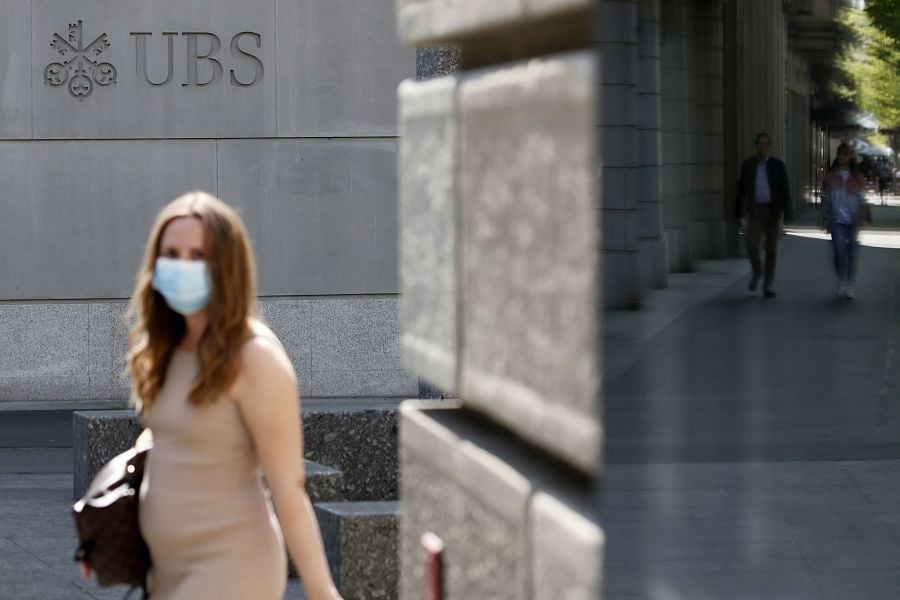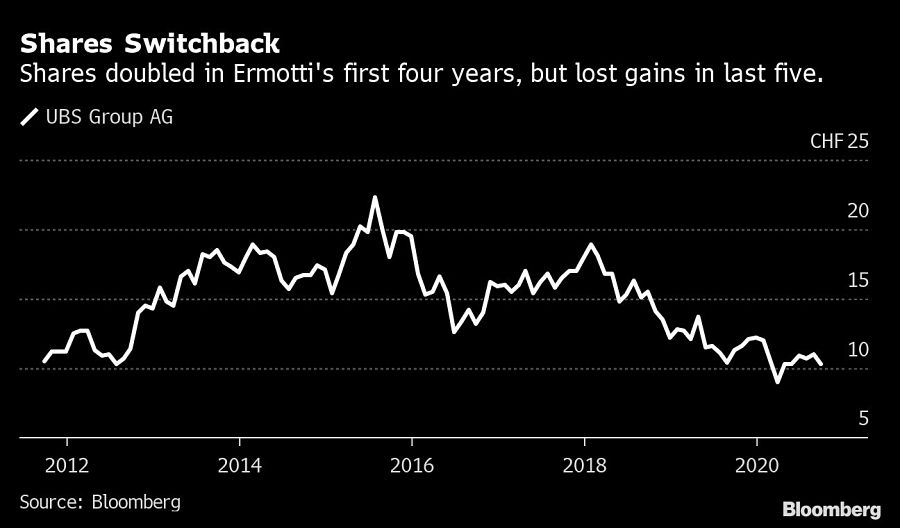

Sergio Ermotti is leaving UBS Group with one of the best quarters since he took over nine years ago, but incoming Chief Executive Ralph Hamers still has plenty to fix.
The world’s largest wealth manager reported better-than-expected profit Tuesday, helped by a booming investment bank, unexpected inflows from rich clients and some of the lowest provisions for bad loans in Europe. UBS even set aside $1.5 billion for share buybacks next year and plans to resume dividend payments next month.
Hamers, who is scheduled to take the helm next month, will now have to persuade regulators to allow payouts as the pandemic resurges. In the U.S., he’ll have to contend with the departure of several teams of financial advisers that left for rival wealth managers. And then there’s the threat of a $5 billion dollar fine still hanging over the bank for allegedly helping French clients evade taxes.
On Tuesday, investors focused on the good news, sending shares of UBS 3.1% higher at 12:10 p.m. in Zurich. That leaves the stock about 11% above where it traded when Ermotti took over, first on an interim basis, in September of 2011.
Third-quarter results were boosted by one-off gains related to the sale of a fund distribution business and intellectual property rights at the investment bank. Net income about doubled from a year earlier.
One of the longest-serving bank CEOs in Europe, Ermotti cut back the investment bank, focusing on the business of wealth management in a pivot that has become a model for some rivals. The shares more than doubled in his first four years, only to give up gains when negative interest rates weighed on European banks and rivals started to catch up.

Hamers, the former head of ING Groep who is known for championing artificial intelligence and digital platforms, will have to find ways to defend the bank’s edge as the COVID-19 pandemic forces lenders to step up cost cuts and reignites consolidation talk. He’ll have to steer a still sizable investment bank and world-leading wealth business -- both areas where he has limited experience -- through the uncertainty created by the crisis.
On Tuesday, UBS warned that the recent increase in cases could impact the global recovery, while saying it expects approval to start buying back shares next year after regulators pushed banks to conserve capital because of the crisis. UBS also accrued about $1 billion toward its expected 2021 dividend and said it plans to pay the second tranche of its 2019 payment on Nov. 27.
“We understand the uncertainties are there, and to some extent we have to wait before we reestablish more significant capital return plans,” Ermotti said on a call with analysts.
The issue of dividends and share buybacks has become a heated one in Europe. A few of the stronger banks in the region have started to lobby for a resumption of payouts again to help revive flagging share prices, though regulators have urged the industry to conserve capital. Within the European Central Bank -- which regulates rivals such as Societe Generale and Deutsche Bank -- there’s still uncertainty as to when it will allow banks to resume payments.
UBS has returned more than $20 billion to shareholders under Ermotti, including dividend accruals and buybacks. Going forward, it plans to change the balance between cash dividends and share repurchases compared with previous years, potentially reducing a dividend that’s higher than many Wall Street peers in favor of the greater flexibility of buybacks.
The pivot to wealth management, along with a conservative approach to lending to its richest clients, has shielded UBS’s loan book to some extent from the impact of the pandemic. UBS added $89 million to its loan loss provisions during the quarter, less than the $225 million that analysts polled by Bloomberg had estimated.
More recently, the firm has been seeking a more aggressive approach to lending, hiring Iqbal Khan, the former head of Credit Suisse Group’s international wealth management unit, to drive that push. Khan and his co-head of wealth management, Tom Naratil, announced organizational changes earlier this year that cut down on loan approval processing times and expanded the types of collateral the bank is willing to accept. UBS is also overhauling the legal structure of its key wealth management unit to free up billions of dollars for lending in higher-growth markets.
The wealth management unit, UBS’s largest contributor of revenue, had been expected to post net outflows of $262 million during the quarter and instead saw inflows of about $1.4 billion. The third quarter was still affected by $5.5 billion of tax-related outflows in the U.S., where the deadline for filing tax returns was moved to July from April. Outflows in the Americas totaled $9.2 billion.
The remainder of outflows was because UBS saw several teams of financial advisers in its wealth unit poached by rivals. Under the brokerage business model, when advisers leave they take their client assets with them. Still, pretax profit at the the business did better than expected and the Asia-Pacific region brought in $10 billion of net new money.
In France, the bank is still waiting for its appeal of a record 4.5 billion-euro ($5 billion) to be heard in court. The retrial was postponed earlier this year until March next year, because of the coronavirus pandemic. The bank is accused of helping wealthy French clients stash undeclared funds in offshore accounts.
As in the prior quarters, UBS got a boost from its trading desks, with revenue from buying and selling fixed-income and foreign exchange assets rising 41% from a year earlier. That’s better than competitors including JPMorgan Chase & Co., Citigroup Inc. and only falling short of Goldman Sachs Group Inc., which saw a 49% gain. UBS’s equities business increased 19%, stripping out gains related to the sale of intellectual property rights.
While investment banks have largely benefited from the volatility created by the pandemic, the crisis has underscored the need for cost cuts, investments in digital platforms and, more broadly, consolidation in Europe’s fragmented banking market. Lenders in Spain and Italy have already struck deals this year, though so far, they’re only domestic.
At UBS, Chairman Axel Weber has drawn up a list of possible partners including Deutsche Bank, BNP Paribas, and Credit Suisse, people familiar with the matter have said. While Weber said publicly that UBS isn’t looking for a bride, he and other European bank leaders have long acknowledged the need for consolidation.

Relationships are key to our business but advisors are often slow to engage in specific activities designed to foster them.

Whichever path you go down, act now while you're still in control.

Pro-bitcoin professionals, however, say the cryptocurrency has ushered in change.

“LPL has evolved significantly over the last decade and still wants to scale up,” says one industry executive.

Survey findings from the Nationwide Retirement Institute offers pearls of planning wisdom from 60- to 65-year-olds, as well as insights into concerns.
Streamline your outreach with Aidentified's AI-driven solutions
This season’s market volatility: Positioning for rate relief, income growth and the AI rebound
